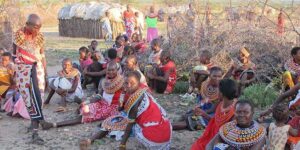Published By: JENTRICE NAISHORUA MUNEI
The first light of dawn washes over Kajiado in shades of gold and dust. Goats stir, fires crackle in tin kettles, and somewhere in the distance, a school bell rings but for many children, its call never reaches their feet. They used to walk in neat lines along the winding paths, laughter carried by the morning breeze. Now, their journeys take them in a different direction, toward water that hides far beneath the ground, toward pastures where their family’s last goats graze, toward survival itself.
The drought has reshaped childhood. Where notebooks once filled small hands, there are now worn jerrycans. Where blackboards once held their eyes, there are endless horizons of cracked earth. Whole classrooms sit hollow, dust gathering on benches as if marking the passing of dreams. Education has not been abandoned by choice, but by necessity a cruel bargain with the land.
When the herds vanish, so does the money for uniforms, books, and the quiet dignity of a full lunchbox. Hunger curls its way into the schoolyard, settling in the eyes of children who can’t focus through the ache in their stomachs. Some fight to keep their heads up through lessons; others simply surrender to sleep, lulled by fatigue rather than comfort.
Even the land itself seems determined to test them. Some schools stand along the invisible highways of wild elephants, massive shadows that appear without warning. They crash through fences, overturning water tanks and scattering anything in their path. Fear spreads faster than news, and parents tell their children to wait, to walk later, to be safe. But each delayed morning is another stolen page from the book of learning.
For girls, the path narrows even further. The pull of early motherhood, of marriages arranged in the quiet spaces of tradition, often closes the school door before their ambitions can take root. Those who find their way back face whispers, stares, and the weight of a journey few understand. Safe hubs offer a lifeline a place to learn without judgment but the climb back is slow, and the road is long.
Still, hope is stubborn here. Beneath acacia trees, parents gather to learn alongside their children, turning education into a family mission. Elders, chiefs, and local volunteers walk dusty trails, knocking on doors to bring children back. Warm meals steam from pots in makeshift kitchens, tempting small feet through the school gates again. Wildlife fences rise where danger roams too close, and community patrols keep watch on the paths where books are carried instead of buckets.
In Kajiado, education is not just a building. It is a moving, breathing thing a lesson delivered wherever a child can be found. It follows them to grazing fields, to dry riverbeds, to villages where the bell may be silent but the hunger to learn still hums beneath the surface.
Because here, when the classroom becomes a mirage, the answer is not to wait for the children to return. It is to go after them across the heat, through the dust, into the spaces where they have drifted and bring them home to learning. The children of Kajiado are still knocking. Their voices are thin but steady against the wind. The question is not whether they can hear the bell. The question is whether we will hear them.


